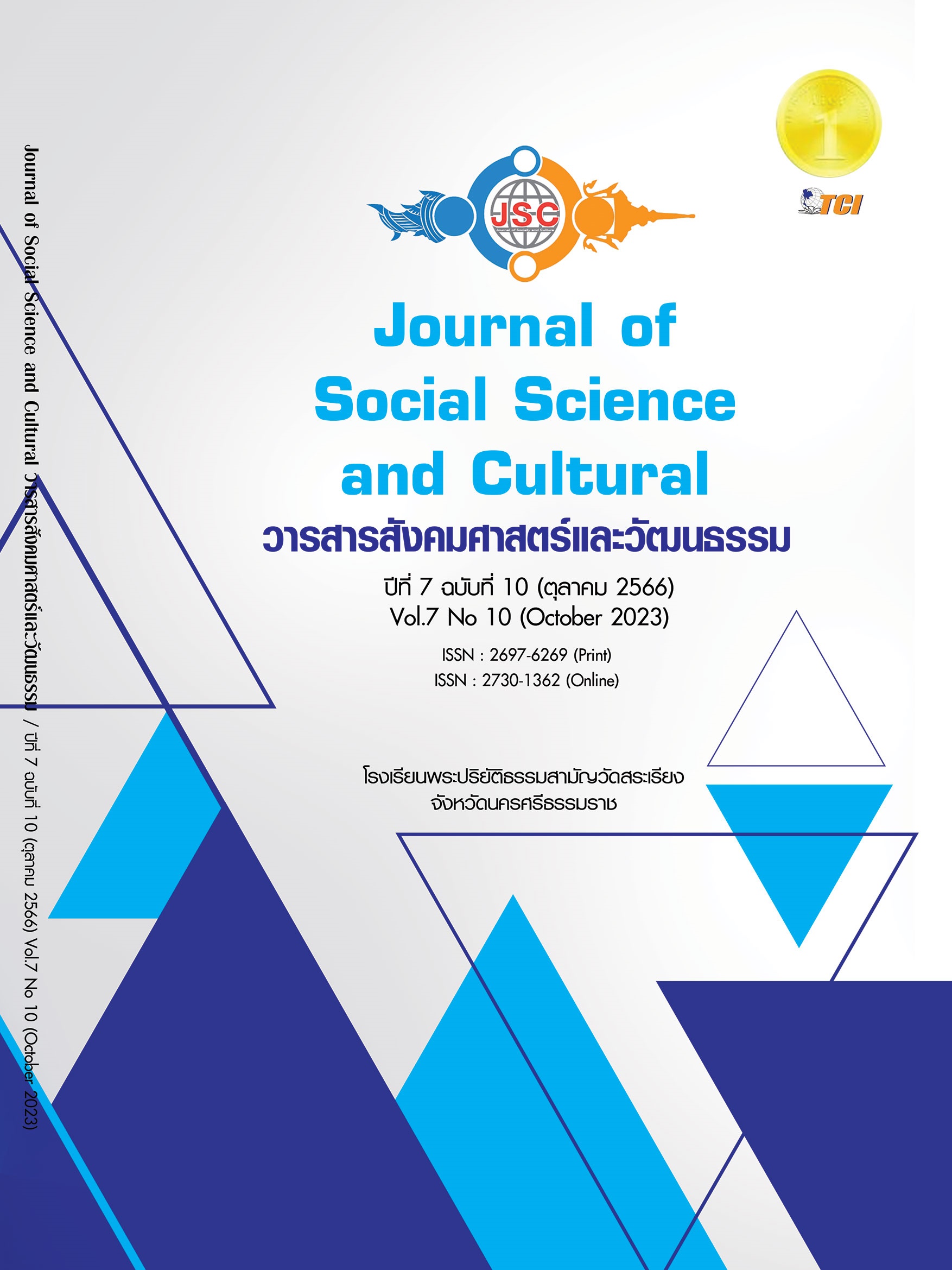LEARNING MANAGEMENT MODEL OF PROJECT BASE LEARNING INTEGRATED COLLABORATIVE LEARNING WITH HIGH SCHOOL STUDENTS UNDER THE OFFICE OF THE BASIC EDUCATION COMMISSION (OBEC)
Main Article Content
Abstract
This research article is a qualitative research. The objective of this study is to develop the learning management model of project base learning integrated collaborative learning with high school students under the office of the basic education commission (OBEC). Data were collected by organizing the workshop seminar using the specific focus group discussion method with an online system through the zoom application from teachers who had experience in project base teaching or work groups teaching among high school’s students at world-class standard schools participating in the World Morality Revival Project (V-Star) included 8 participants: 4 teachers from 4 schools and 4 academic staffs from International Buddhist Clubs (IBS) who has the responsibility to develop the curriculum of project. The inclusion criteria were met and got the approval from all involved parties to reduce the selection bias. Qualitative data were analyzed. The research revealed that the learning management model of project base learning integrated collaborative learning of high school students has integrated 4 factors: self-efficacy, attitude, group efficacy and saraniyadhamma six into 6 steps of project base learning management: 1) basic knowledge teaching 2) interest arousing 3) organizing collaborative groups 4) knowledge seeking 5) summary of what students learned and 6) work presenting. The approach for integration are 1) point out the advantages 2) organize activities to enhance ideas and experiences 3) success giving 4) keeping role models in mind 5) admiration and encouragement.
Article Details
References
กองนโยบายและแผน สำนักงานอธิการบดี มหาวิทยาลัยราชภัฏสวนสุนันทา. (2560). สรุปองค์ความรู้ประจำปีงบประมาณ 2560. เรียกใช้เมื่อ 23 ตุลาคม 2566 จาก https://ssru.ac.th/datafiles/ssrubook /file/manage4.pdf
ขวัญชัย กิตฺติเมธี. (2562). การสอนศีลธรรมในโรงเรียนประถมศึกษาตามหลักไตรสิกขา. วารสารวิชาการสถาบันพัฒนาพระวิทยากร, 2(2), 86-98.
ครูต้นน้ำ. (9 มกราคม 2566). รูปแบบการจัดการเรียนรู้การทำโครงงานบูรณาการการเรียนรู้ร่วมกันกับนักเรียนชั้นมัธยมศึกษาตอนปลาย. (วิโรจน์ วิจิตรธำรงศักดิ์, ผู้สัมภาษณ์)
ครูต้นหญ้า. (9 มกราคม 2566). รูปแบบการจัดการเรียนรู้การทำโครงงานบูรณาการการเรียนรู้ร่วมกันกับนักเรียนชั้นมัธยมศึกษาตอนปลาย. (วิโรจน์ วิจิตรธำรงศักดิ์, ผู้สัมภาษณ์)
คุณต้นข้าว. (9 มกราคม 2566). รูปแบบการจัดการเรียนรู้การทำโครงงานบูรณาการการเรียนรู้ร่วมกันกับนักเรียนชั้นมัธยมศึกษาตอนปลาย. (วิโรจน์ วิจิตรธำรงศักดิ์, ผู้สัมภาษณ์)
ดุษฎี โยเหลา และคณะ. (2557). การศึกษาการจัดการเรียนรู้แบบ PBL ที่ได้จากโครงการสร้างชุดความรู้เพื่อสร้างเสริมทักษะแห่งศตวรรษที่ 21 ของเด็กและเยาวชน: จากประสบการณ์ความสำเร็จของโรงเรียนไทย. กรุงเทพมหานคร: หจก. ทิพยวิสุทธิ์.
นนทลี พรธาดาวิทย์. (2559). การจัดการเรียนรู้แบบ Active Learning. กรุงเทพมหานคร: ทริปเพิ้ลเอ็ดดูเคชั่น.
ประทับใจ ทัศนแจ่มสุข. (2559). การจัดการเรียนรู้แบบใฝ่รู้ (Active Learning) เพื่อแลกเปลี่ยนเรียนรู้ ในกิจกรรมการจัดการเรียนรู้ (Knowledge Management) โปรแกรมวิชาภาษาอังกฤษ ประจำภาคเรียนที่ 1 ปีการศึกษา 2558 คณะมนุษยศาสตร์และสังคมศาสตร์ มหาวิทยาลัยราภัฏกำแพงเพชร. ใน ปรียานุช พรหมภาสิต (บก.), คู่มือการจัดการเรียนรู้ "Active Learning (AL) for Huso at KPRU". กำแพงเพชร: มหาวิทยาลัยราชภัฏกำแพงเพชร.
ปรียาพร วงศ์อนุตรโรจน์. (2553). จิตวิทยาการศึกษา. กรุงเทพมหานคร: ศูนย์สื่อเสริมกรุงเทพ.
พระราชบัญญัติการศึกษาแห่งชาติ (ฉบับที่ 4). (2562). ราชกิจจานุเบกษา เล่มที่ 136 ตอนที่ 57 ก หน้า 49 (1 พฤษภาคม 2562).
มนาปี คงรักช้าง และชุติมา สุรเศรษฐ. (2559). การศึกษาผลของโปรแกรมการรับรู้ความสามารถของตนเองในอาชีพต่อการตัดสินใจเลือกอาชีพของนักเรียนมัธยมศึกษาปีที่ 6. An Online Journal of Education, 11(3), 59-79.
โรงเรียนช่างฝีมือทหาร. (2561). คู่มือการจัดการเรียนรู้แบบใช้ปัญหาเป็นฐาน (Problem Based Learning). เรียกใช้เมื่อ 29 สิงหาคม 2566 จาก https://www.mtts.ac.th/mtts4/assets/pdf/คู่มือการจัดการเรียนรู้แบบใช้ปัญหาเป็นฐาน.pdf
วิชัย เสวกงาม. (2555). การเรียนการสอนทางตรง: สอนอย่างไรให้มีประสิทธิภาพในบริบทการจัดการศึกษาที่เน้นผลลัพธ์. วารสารครุศาสตร์, 40(2), 255-272.
วิโรจน์ วิจิตรธำรงศักดิ์ และคณะ. (2565). ปัจจัยเชิงสาเหตุพหุระดับที่ส่งผลต่อการเรียนรู้ร่วมกันของนักเรียนชั้นมัธยมศึกษาตอนปลาย. วารสารพฤติกรรมศาสตร์เพื่อการพัฒนา, 14(2), 59-79.
Anuradha, G. A. (1995). Collaborative Learning Enhances Critical Thinking. Retrieved October 23, 2023, from https://scholar.lib.vt.edu/ejournals/JTE/v7n1/gokhale.jte-v7n1.html
Bandura, A. (1989). Regulation of cognitive processes through perceived self-efficacy. Developmental Psychology, 25(5), 729-735.
Knoll, S. W. et al. (2010). Collaboration ontology: applying collaboration knowledge to a generic group support system. In De Vreede, G. J. (Ed.), Proceedings of the GDN 2010 (pp. 1-37). Omaha: Center for Collaboration Science.
OECD. (2017). PISA 2015 Assessment and Analytical Framework. German, French: OECD.
Patton, M. Q. (2015). Qualitative Research & Evaluation Methods. (4th). Thousand Oaks: Sage Publications.
Retnowati, E. et al. (2017). Can collaborative learning improve the effectiveness of worked examples in learning mathematics. Journal of Educational Psychology, 109(5), 666-679.
Soller, A. (2001). Supporting Social Interaction in an Intelligent Collaborative Learning System. International Journal of Artificial Intelligence in Education (IJAIED), 2001(12), 40-62.


